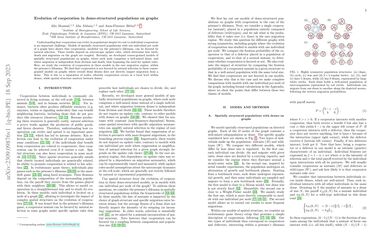Evolution of cooperation in deme-structured populations on graphs
Understanding how cooperation can evolve in populations despite its cost to individual cooperators is an important challenge. Models of spatially structured populations with one individual per node of a graph have shown that cooperation, modeled via the prisoner's dilemma, can be favored by natural selection. These results depend on microscopic update rules, which determine how birth, death and migration on the graph are coupled. Recently, we developed coarse-grained models of spatially structured populations on graphs, where each node comprises a well-mixed deme, and where migration is independent from division and death, thus bypassing the need for update rules. Here, we study the evolution of cooperation in these models in the rare migration regime, within the prisoner's dilemma. We find that cooperation is not favored by natural selection in these coarse-grained models on graphs where overall deme fitness does not directly impact migration from a deme. This is due to a separation of scales, whereby cooperation occurs at a local level within demes, while spatial structure matters between demes.
PDF Abstract